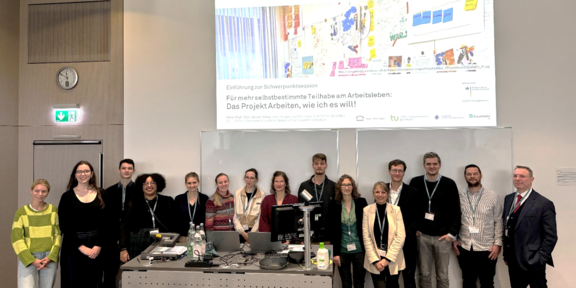Community Health Conference: Large participation of the research group Innovation of Inclusion

In the focus session entitled ‘For more self-determined participation in working life: The project ‘Working the way I want to work!’ (AWIEW), Prof. PD Dr. Pelka first presented the approach of the project. He outlined the background with regard to the labour market situation of people with disabilities and the still low transition rates of employees from sheltered workshops for people with disabilities to the general labour market. The transdisciplinary approach of AWIEW focuses on the participatory design and testing of new approaches for pathways into the general labour market for people with disabilities, with the help of an AI-based needs assessment tool that is complemented by new practices of integration assistance.
After Bastian Pelka's introduction, Adiaha Ita and Lawrence Willschrei, supported by Jill Backs, Joline Düring and Markus Ihsecke-van Ackern (Franz-Sales Haus), presented the perspectives of professionals and employees on the practice of integration assistance. While Adiaha Ita took the perspective of the institutions and professionals of the Franz Sales Haus as a provider of welfare services, Lawrence Willschrei provided insights into his experiences as an employee of the Franz Sales workshops. Both showed the challenges that people with disabilities face in their professional orientation when they are employed in workshops for people with disabilities, thus emphasising the need for new approaches.
This was followed by a presentation by Diana Cürlis (FH Münster) on the transformation of insights from a co-design phase into requirements for the needs assessment tool. In a series of workshops, the team from FH Münster implemented a participatory design process with people with disabilities, supported by teams from the project partners. Diana Cürlis showed how the results of the workshops were processed in the context of content analyses for the development of the needs assessment tool and also presented the underlying process by which all results of the participatory phases and research activities are to be incorporated into the development of the tool.
With the support of Prof. PD Dr. Bastian Pelka, Dr. Ann Christin Schulz and Felix Fankhänel, Lisa Preissner and Daniel Krüger followed up with a presentation of research results on framework conditions in sheltered workshops and other organisations of the German rehabilitation system. As part of an embedded research within the AWIEW project, they had the opportunity to gain deep insights into the practical work in sheltered workshops, special schools, administrative units and the field of labour market integration. On this basis, they were able to identify requirements for the needs assessment tool and its compatibility for practical use in the institutions.
Prof. Dr. Harald Mathis, supported by Carina Goretzky (Fraunhofer Institute for Applied Information Technology FIT), provided insights into the technical potential and challenges of developing an AI-based tool and answering the question of how and where AI could help the AWIEW project. He also added the perspective of employers and emphasised that they also need a tool to help them recruit employees.
The presentations were followed by a lively discussion with around 50 attendees from research and practice, in which the goals and approach of AWIEW were explicitly praised and numerous perspectives for development strands were identified.
During a session on inclusion and work, members of the research group presented results from the project ‘Evaluation of the “Einheitliche Ansprechstellen für Arbeitgebende” (single contact points for employers), viewed as social innovation in the ecosystem of the rehabilitation system and the labour market’ (EvaEfA). Sarah Lamb, Prof. PD Dr. Bastian Pelka, Dr. Sarah Schulze and Dr. Jana York (Faculty of Rehabilitation Science) outlined their dialogue-based participatory research strategy in a mixed-methods design. The focus was also on the integration and connection of the points of single contact for employers in the ecosystem of vocational rehabilitation and participation, which was developed using qualitative expert interviews and workshops as well as qualitative and quantitative social network analysis.




![[Translate to English:] [Translate to English:]](/storages/zentraler_bilderpool/_processed_/a/f/csm_Kontakt_b86e8d8ecc.png)
